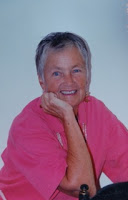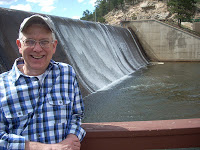For the last few years I have been compiling memories in the
form of memoir essays. It’s fun and interesting to recollect what I have done
with my life over the years. I do not see myself writing an autobiography, however,
but rather being selective on episodes to delve into. I do not begin at my true
beginning with my childhood which, to me, seems as uninteresting now as it was
then. A pretty ordinary stretch of life filled with good memories but little
drama, a time that I don’t see as worth writing about.
form of memoir essays. It’s fun and interesting to recollect what I have done
with my life over the years. I do not see myself writing an autobiography, however,
but rather being selective on episodes to delve into. I do not begin at my true
beginning with my childhood which, to me, seems as uninteresting now as it was
then. A pretty ordinary stretch of life filled with good memories but little
drama, a time that I don’t see as worth writing about.
So, it’s not really my life story that I am filling pages
with but reflections on where life has taken me. It has taken me many
fascinating places. And I enjoy remembering where I have gone. Memory is, to
paraphrase a common saying, like drinking sea water—the more you drink, the
thirstier you get. Writing a memoir is like a quest. You might say, I am
hunting my past.
with but reflections on where life has taken me. It has taken me many
fascinating places. And I enjoy remembering where I have gone. Memory is, to
paraphrase a common saying, like drinking sea water—the more you drink, the
thirstier you get. Writing a memoir is like a quest. You might say, I am
hunting my past.
I was remembering an episode in my past last week and the
more I thought about it and wrote out the story, the more that came to me. The story
was about the day a kind, older man tempted me out of my closet. He didn’t
succeed. I was foolish enough to pass up the opportunity he offered. I thought
I had written out the story. But then, wait, something else happened back then.
He said something to me. What was it? I plied my memory until it started coming
back to me. He said something like, “You don’t have to be alone, you know.” I’d
forgotten that last part.
more I thought about it and wrote out the story, the more that came to me. The story
was about the day a kind, older man tempted me out of my closet. He didn’t
succeed. I was foolish enough to pass up the opportunity he offered. I thought
I had written out the story. But then, wait, something else happened back then.
He said something to me. What was it? I plied my memory until it started coming
back to me. He said something like, “You don’t have to be alone, you know.” I’d
forgotten that last part.
The tools I use in this hunt include not only my memory of
events—fond or not so fond—but also documents, old journals, and, lots of
published clips from my days as a journalist in San Francisco. I sometimes even
do some research and fact checking.
events—fond or not so fond—but also documents, old journals, and, lots of
published clips from my days as a journalist in San Francisco. I sometimes even
do some research and fact checking.
I have all the documents, for example, of the struggle with
my draft board from 1968 to 1972 that culminated in my refusing induction into
the U.S. Army. Having long had a fondness for writing, I wrote for some
underground papers in California back then and actually found copies in the San
Francisco Public Library. Some of those pieces I’m proud of and some I dismiss
as just getting carried away with the rhetoric of that era. Did I really call
the President of the United States a pig? Well, he probably deserved it.
my draft board from 1968 to 1972 that culminated in my refusing induction into
the U.S. Army. Having long had a fondness for writing, I wrote for some
underground papers in California back then and actually found copies in the San
Francisco Public Library. Some of those pieces I’m proud of and some I dismiss
as just getting carried away with the rhetoric of that era. Did I really call
the President of the United States a pig? Well, he probably deserved it.
The only time in my life that I kept a personal journal was
when I began coming out. I wrote in it faithfully almost every day for a few
years and found it a great way to see who I was and how I was changing. Some
memories are flattering and some are not. At times, I am roaring with happiness
from new found friends and experiences. Other times, I am wishing it would all
go away and I could just be normal, whatever that might mean. It helps to see
the bad with the good.
when I began coming out. I wrote in it faithfully almost every day for a few
years and found it a great way to see who I was and how I was changing. Some
memories are flattering and some are not. At times, I am roaring with happiness
from new found friends and experiences. Other times, I am wishing it would all
go away and I could just be normal, whatever that might mean. It helps to see
the bad with the good.
My hunt has produced results, maybe I should call them
trophies. I am seeing patterns that I like. It seems to me that my life has
been blessed with two Spring times and maybe even a third. Twice I have felt
desperate and besieged by forces beyond my control and twice I have responded
to those challenges by entering a time of creativity and change. The first time
was when I decided to drop out of college and take on the military draft. That
led to a multitude of incredible experiences. The second spring came of course
when I embraced being gay and found friendship and love, challenge and
strength, community and history.
trophies. I am seeing patterns that I like. It seems to me that my life has
been blessed with two Spring times and maybe even a third. Twice I have felt
desperate and besieged by forces beyond my control and twice I have responded
to those challenges by entering a time of creativity and change. The first time
was when I decided to drop out of college and take on the military draft. That
led to a multitude of incredible experiences. The second spring came of course
when I embraced being gay and found friendship and love, challenge and
strength, community and history.
And the third spring? Well, it seems to be right now. As I’m
growing older, I find myself again in a period of challenge and change and
great creativity at the same time. I like remembering my past, chasing it down,
writing it down. This hunt has its satisfactions in knowing the ground on which
I now stand. Where I’m headed is growing out of where I’ve been. I like being a
hunter and the hunt goes on.
growing older, I find myself again in a period of challenge and change and
great creativity at the same time. I like remembering my past, chasing it down,
writing it down. This hunt has its satisfactions in knowing the ground on which
I now stand. Where I’m headed is growing out of where I’ve been. I like being a
hunter and the hunt goes on.
© 19 Sep 2016
About the Author
Nicholas grew up in Cleveland,
then grew up in San Francisco, and is now growing up in Denver. He retired from
work with non-profits in 2009 and now bicycles, gardens, cooks, does yoga,
writes stories, and loves to go out for coffee.
then grew up in San Francisco, and is now growing up in Denver. He retired from
work with non-profits in 2009 and now bicycles, gardens, cooks, does yoga,
writes stories, and loves to go out for coffee.



